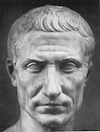Crossing the Rubicon – Caesar and the Birth of an English Idiom
- The point of no return is the point beyond which one must continue on his or her current course of action because turning back is physically impossible, prohibitively expensive or dangerous.
- A particular irreversible action (e.g., setting off an explosion or signing a contract)
 On the 10th January 49 BC Julius Caesar led one of his legions across a small stream called the Rubicon, thus defying the Roman Senate and breaking the Lex Cornelia Majestatis that forbade a general from bringing an army out of the province to which he was assigned. Turning to his lieutenants just before he crossed, Caesar remarked bitterly, ‘Jacta alea est‘ (The die is cast.) It was a de facto declaration of war against the Roman Republic.
On the 10th January 49 BC Julius Caesar led one of his legions across a small stream called the Rubicon, thus defying the Roman Senate and breaking the Lex Cornelia Majestatis that forbade a general from bringing an army out of the province to which he was assigned. Turning to his lieutenants just before he crossed, Caesar remarked bitterly, ‘Jacta alea est‘ (The die is cast.) It was a de facto declaration of war against the Roman Republic.
The Rubicon is a narrow river south of Ravenna that marked the border between the Republic and its province of Cisalpine Gaul, now northern Italy. For the past nine years Caesar had been governor there and also of Transalpine Gaul, most of today’s France and Belgium. There he had waged ferocious war on the primitive local tribes, subduing them in the name of Rome. It was said that he had conquered 800 towns while defeating enemy armies totalling 3 million men, of whom a third were killed and another third sold into slavery.
But now the Roman Senate, jealous of Caesar’s success and fearful of his ambitions, were determined to bring him to heel. They demanded that he give up command of his legions and report back to Rome as an ordinary citizen. Caesar knew that, despite his enormous achievements, a small clique of senators were not willing to concede to him the honours he thought he deserved, even wanted to destroy him. He believed, almost certainly correctly, that, once he had relinquished his power, his enemies would trump up charges against him and then ruin or even execute him.
Some credit Caesar with loftier motives – the urgent need to rehabilitate the creaking Roman state that was badly misgoverned by a fractious and self-serving nobility. Most agree that he had no desire to start a war, let alone create a dictatorship, but his amour propre demanded that the ungrateful senators recognise his achievements and reward him as they had so many other great generals in the past.
When Caesar crossed the Rubicon, the die really was cast. Not only did his action initiate a three-year civil war but it also led to the end of the Republic and the age of Roman emperors. Many historians consider it the most extraordinary achievement in human history. One man, armed only with a few legions, his own military genius and what Pliny the Elder called ‘the fiery quickness of his mind’, took over the largest and most advanced empire the world had known.







You must be logged in to post a comment.